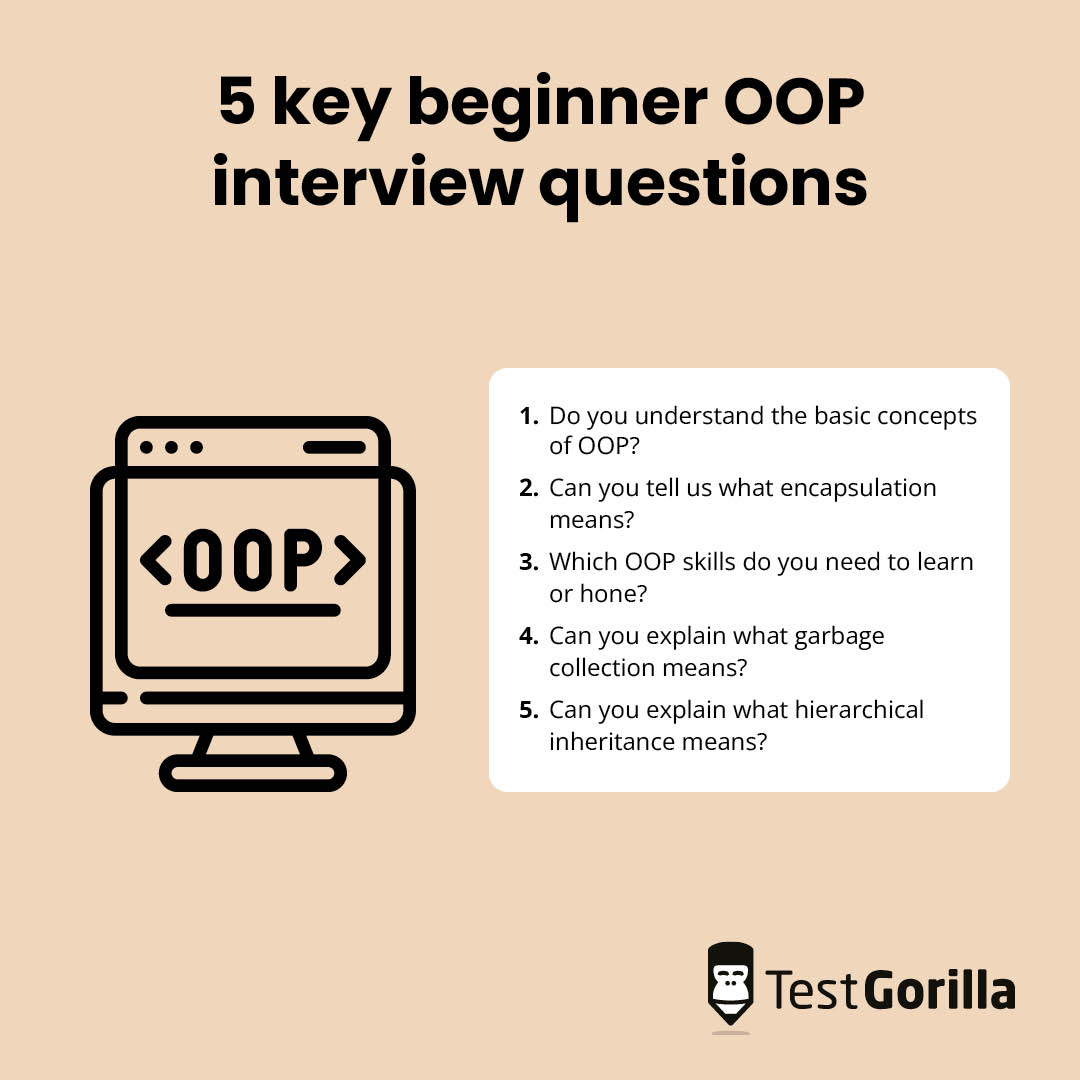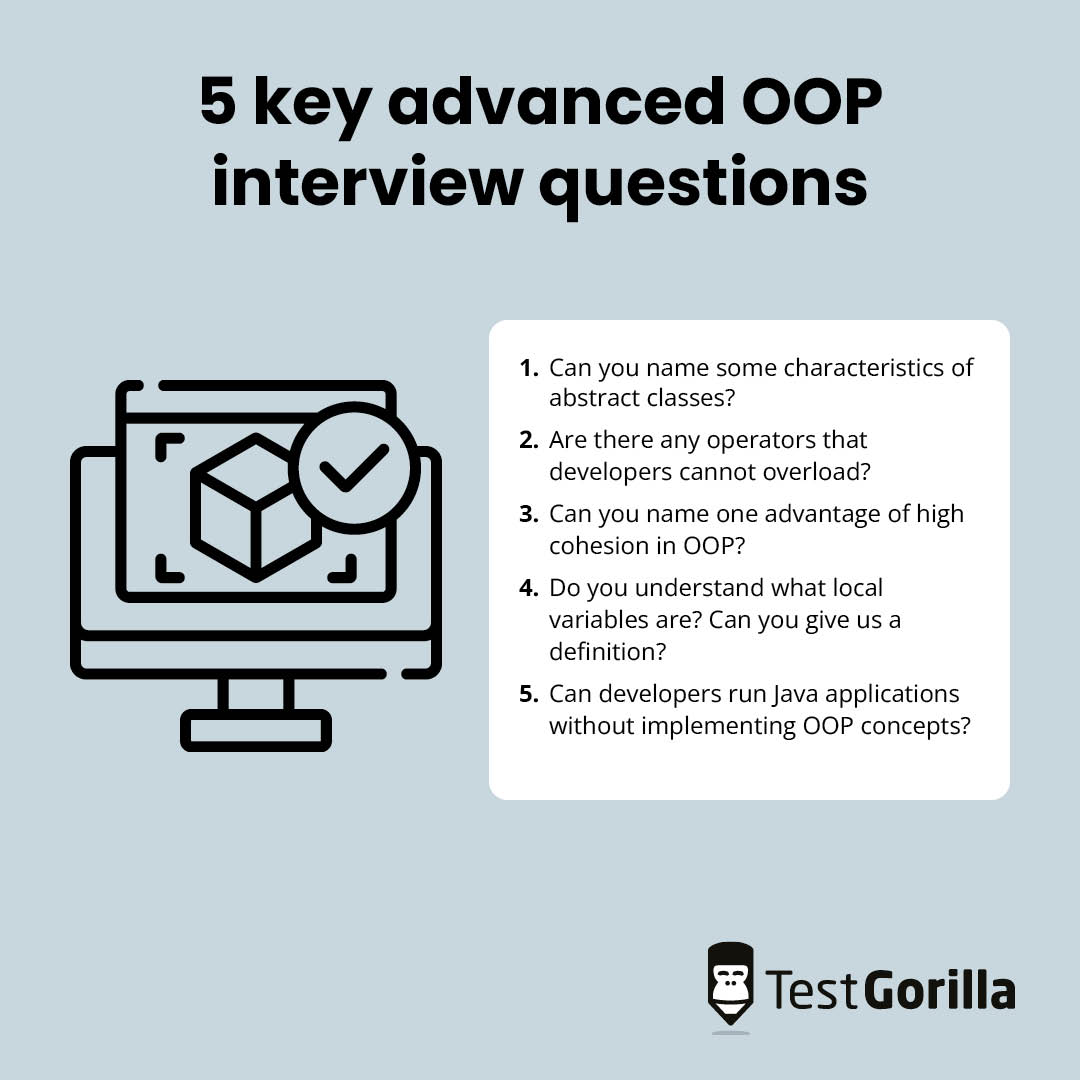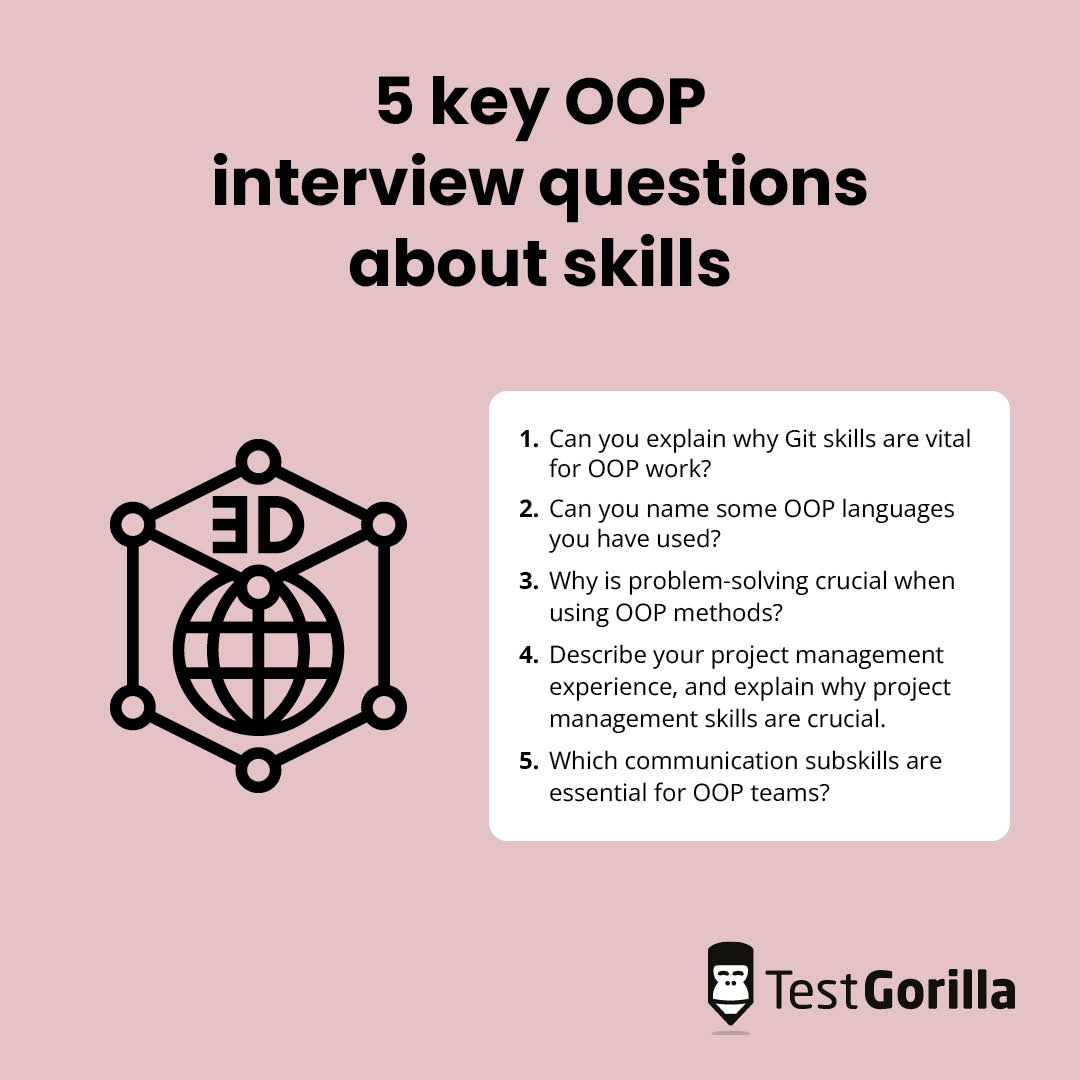66 OOP interview questions to ask programmers and developers
Object-oriented programming (OOP) is a model programmers use to design programs using objects. Since OOP is a multifaceted concept, ensure you have an expert programmer on your team to complete projects that use this model.
If your team lacks an experienced object-oriented programmer, you may need to hire one. To find a pro, you can ask candidates to complete an Object Oriented Programming test and interview those with the best results.
But what if you don’t know what OOP interview questions to ask in an interview?
There’s no need to complete a time-consuming assessment process. Check out the 66 OOP interview questions below to test your candidates’ knowledge and experience.
Table of contents
- 38 beginner OOP interview questions to ask junior programmers
- 5 key beginner OOP interview questions and sample answers
- 18 advanced OOP interview questions to help assess experienced programmers
- 5 key advanced OOP interview questions and sample answers
- 10 OOP interview questions related to skills and abilities
- 5 key OOP interview questions and sample answers about skills
- For which roles can you use our Object Oriented Programming test?
- Assess programmers using OOP interview questions and TestGorilla
38 beginner OOP interview questions to ask junior programmers
Ask junior programmers some of the following beginner OOP interview questions to test their knowledge and skills.
1. Can you tell us what OOP means and why it’s important for developers?
2. Do you understand what procedural programming is? Give us a definition.
3. Can you explain the main differences between procedural programming and OOP?
4. Do you understand the basic concepts of OOP?
5. Can you tell us what encapsulation means?
6. What do you understand about abstraction?
7. What do you understand about method overloading?
8. Can you tell us what you understand about method overriding?
9. Do you know the six types of OOP inheritance?
10. Are there any limitations to OOP? Can you name three?
11. Explain what constructors do.
12. Can you name four types of constructors?
13. Can you explain to us what classes are in OOP?
14. Can you tell us what structures are in OOP?
15. What do you understand about access modifiers?
16. What was the first OOP language?
17. Can you define hybrid inheritance?
18. Can you explain what hierarchical inheritance means?
19. What do you understand about superclasses, base classes, and parent classes?
20. What do you understand about subclasses?
21. Do you understand what polymorphism is?
22. Do you understand what static polymorphism is?
23. Can you define dynamic polymorphism?
24. What do you understand about operator overloading?
25. What do you understand about encapsulation?
26. Can you explain what virtual functions are?
27. Can you tell us what destructors are?
28. What do you understand about copy constructors?
29. Can you explain what garbage collection means?
30. Do you understand what final variables are? Can you give us a definition?
31. Do you know what exceptions are? Can you explain what they do?
32. What do you understand about exception handling?
33. How are errors different from exceptions?
34. Do you understand what catch blocks are? Can you explain what they do?
35. Can developers call the base method and avoid instantiating it?
36. What does structure-oriented programming mean?
37. What do you understand about access specifiers?
38. Which OOP skills do you need to learn or hone?
5 key beginner OOP interview questions and sample answers
Refer to the five sample answers to these important beginner OOP interview questions to assess your candidates’ responses.
1. Do you understand the basic concepts of OOP?
Junior applicants should understand the fundamental concepts of OOP, such as inheritance, encapsulation, polymorphism, and abstraction. If candidates can explain what each of these concepts means, they are the ones to consider for a second interview.
For example, candidates should know that abstraction is a concept programmers use to separate an object’s interface from the implementation process and create application components.
2. Can you tell us what encapsulation means?
Encapsulation is an OOP concept that involves bundling data with methods that work on that data. Applicants might also explain that encapsulation helps programmers restrict direct access to a few of the object’s components.
3. Which OOP skills do you need to learn or hone?
Not all your candidates will have every single OOP skill, so you should consider whether they are trying to hone the skills they lack. From knowledge of Git to proficiency in various OOP languages, many skills are important for OOP developers, so listen for answers that explain how your candidates are trying to improve.
You can also test their Git or OOP language skills with our Git or Java skills tests.
4. Can you explain what garbage collection means?
Garbage collection is a memory recovery mechanism that releases memory space with the help of garbage collection engines. Candidates should know that this process releases space the system reserves for functions the application no longer uses.
They might also explain that garbage collection features are available in programming languages such as Java and C#.
5. Can you explain what hierarchical inheritance means?
Hierarchical inheritance is a type of inheritance in which multiple subclasses inherit the methods and properties of one parent class.
Applicants may give an example of hierarchical inheritance in OOP to show their knowledge when they respond to this question. For example, they might explain that a Flower class can have Rose, Tulip, and Lily as subclasses. All of these subclasses inherit properties from the parent class.
The best insights on HR and recruitment, delivered to your inbox.
Biweekly updates. No spam. Unsubscribe any time.
18 advanced OOP interview questions to help assess experienced programmers
Ask senior-level programmers some of these advanced OOP interview questions to test their OOP proficiency.
1. Do you understand what interfaces are? Can you give us a definition?
2. What do you understand about pure virtual functions?
3. How are methods different from classes?
4. Do you understand the difference between abstract classes and interfaces?
5. Can you name some characteristics of abstract classes?
6. What do you understand about constructor chaining?
7. Do you understand what coupling is in OOP?
8. Can you explain why coupling is useful in OOP?
9. Can you explain to us what tight coupling is?
10. Can you explain to us what loose coupling is?
11. Are there any operators that developers cannot overload?
12. Can you name one advantage of high cohesion in OOP?
13. Give us a definition of primitive variables in OOP.
14. Can you explain what reference variables are?
15. Can you tell us what instance variables are?
16. What do you understand about static variables?
17. Do you understand what local variables are? Can you give us a definition?
18. Can developers run Java applications without implementing OOP concepts?
5 key advanced OOP interview questions and sample answers
Check the sample answers to these five important advanced OOP interview questions to assess your applicants’ responses.
1. Can you name some characteristics of abstract classes?
If a candidate has sufficient OOP experience, they will be able to describe some characteristics of abstract classes. To show their advanced knowledge of OOP, applicants might mention some of the following aspects of abstract classes:
Programmers cannot instantiate abstract classes
Developers cannot modify abstract classes with sealed modifiers
Abstract classes can have pure virtual and non-abstract functions
2. Are there any operators that developers cannot overload?
Applicants should know that an operator is a symbol that performs operations on values and variables. They should also explain that one operator developers cannot overload is the + operator, though it’s possible to overload all other operators.
3. Can you name one advantage of high cohesion in OOP?
Ask your candidates this OOP interview question to test their advanced OOP knowledge. Knowledgeable applicants will understand that cohesion refers to how strongly elements within a module are related on a functional level. High cohesion can:
Enhance the code’s maintainability
Make the code more reusable
4. Do you understand what local variables are? Can you give us a definition?
Candidates answering this OOP interview question can prove their expertise by mentioning that systems create local variables when a function begins execution. They should also understand that local variables do not provide data sharing and may compare them with global variables, which do provide data sharing.
5. Can developers run Java applications without implementing OOP concepts?
Running Java applications without implementing OOP concepts is impossible because these programs rely on OOP models. In other words, since developers must instantiate objects when they make Java programs, they cannot separate the OOP concept from the development process.
10 OOP interview questions related to skills and abilities
Ask your applicants some of the following 10 OOP interview questions about skills and abilities to test their aptitude.
1. Can you explain why attention to detail is important for OOP?
2. Why is problem-solving crucial when using OOP methods?
3. Can you explain why Git skills are vital for OOP work?
4. Can you name some OOP languages you have used?
5. Why is time management essential for OOP work?
6. Can you explain why critical-thinking skills are important for OOP programmers?
7. Which communication subskills are essential for OOP teams?
8. Can you explain to us why debugging skills are crucial for OOP programmers?
9. Why are analytical skills fundamental for OOP teams?
10. Describe your project management experience, and explain why project management skills are crucial.
5 key OOP interview questions and sample answers about skills
Evaluate your applicants’ responses using our sample answers to these five important OOP interview questions.
1. Can you explain why Git skills are vital for OOP work?
Since Git stores object-oriented objects and data, candidates should understand that Git skills are important for OOP work. Git is a version control system that ensures programmers keep track of their code versions and return to a previous state if needed.
Applicants should know that the version control system stores three types of objects:
Blob: stores the original content
Tree: stores directories in the project
Commit: created when developers make a commit
It’s crucial to determine if your candidates have Git skills. To assess your applicants’ abilities, use our Git skills test.
2. Can you name some OOP languages you have used?
Many OOP languages are ideal for creating applications, and candidates should be able to provide a few examples. Some of the most popular OOP languages include:
C++
Python
JavaScript
PHP
Listen for responses that mention some advantages of using these programming languages, such as that they save time and help reduce coding errors.For Python positions, you can ask more specific Python OOPs interview questions. You can also test your applicants’ programming skills with our Python, JavaScript, C++, and PHP skills tests.
3. Why is problem-solving crucial when using OOP methods?
Skilled candidates should know that problem-solving can help programmers define and resolve programming problems. The more advanced an applicant’s problem-solving skills, the faster they can design, identify, and implement methods to solve issues and develop applications.
A few problem-solving methods that programmers might mention when responding to this OOP interview question include the following:
Analyzing the issue or problem
Developing an algorithm
Writing the code to solve the issue
Testing and debugging the code
Do you need a fast way to test your candidates’ problem-solving skills? Use our Problem Solving skills test to evaluate their abilities.
4. Describe your project management experience, and explain why project management skills are crucial.
Project management skills help programmers follow and manage an OOP project’s development. A few project management skills applicants should mention include:
Estimation and project scheduling
Roadmap creation
Risk management
Documentation creation
If you need to assess your applicants’ project management skills, consider using our Project Management skills test, which reduces time-to-hire metrics.
5. Which communication subskills are essential for OOP teams?
OOP teams must communicate with team members and other teams in the company. These responsibilities require a few important communication subskills, such as active listening, written communication, and non-verbal communication.
Consider whether your candidates understand why these subskills are essential for sharing ideas with technical and non-technical individuals.
One data-driven option to evaluate your applicants’ communication skills is to use our Communication skills test.
For which roles can you use our Object Oriented Programming test?
Our Object Oriented Programming test is ideal for roles that require a mid-level grasp of OOP. Some specific roles for which you can use our test include software engineers, back-end developers, front-end developers, and game developers.
This test will help you assess the following four OOP subskills:
Variables and control flow
Classes and objects
The four principles of OOP
Abstract classes and interfaces
Select up to four other related OOP tests when you build your assessment to evaluate your candidates’ skills, and then create a shortlist of candidates to interview.
Assess programmers using OOP interview questions and TestGorilla
Assessing programmers is a simple process when you use skills assessments and OOP interview questions. These methods will give you enough data to determine if your candidates have the expertise to join your team.
Looking for more information on how to build an assessment? TestGorilla is easy to use. Simply choose an assessment name, select your tests, and add custom questions.
If you want to see how TestGorilla works, register for a demo to find out how data-driven hiring can help you save time and hire objectively.
Choose TestGorilla and our OOP interview questions to find and hire the right professional for your organization.
You've scrolled this far
Why not try TestGorilla for free, and see what happens when you put skills first.

















